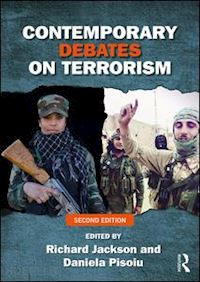Introduction: contemporary debates on terrorism, Richard Jackson and Daniela Pisoiu PART I: THE DEFINITION AND STUDY OF TERRORISM 1. Is terrorism still a useful analytical term or should it be abandoned? YES: An agreed concept is possible and useful, Anthony Richards NO: A landscape of meaning: constructing understandings of political violence from the broken paradigm of ‘terrorism’, Dominic Bryan 2. Is Critical Terrorism Studies a useful approach for the study of terrorism? YES: The necessity of a critical approach, Christopher Baker-Beall NO: Don’t give it the oxygen of publicity, Roger Mac Ginty PART II: CATEGORIES OF TERRORISM 3. Is there a ‘new terrorism’ in existence today? YES: The relevance of the ‘new terrorism’ concept, Ersun N. Kurtulus NO: The fallacy of the new terrorism thesis, Isabelle Duyvesteyn and Leena Malkki 4.Can states be terrorists? YES: Terrorism is an equal opportunity tactic, Scott Englund and Michael Stohl NO: State terrorism: who needs it?, Colin Wight PART III: THE TERRORISM THREAT 5. Is terrorism a serious threat to international and national security? YES: The continuing threat to state security, James Lutz and Brenda Lutz NO: The myth of terrorism as an existential threat, Jessica Wolfendale 6. Is WMD terrorism a likely prospect in the future? YES: The impact of CBRN terrorism – a general perspective, Natvidad Carpintero-Santamaria NO: WMD terrorism: the prospects, John Mueller 7. Is cyber-terrorism a real threat? YES: Why we should start from this assumption, Maura Conway NO: A narrated catastrophe, not a real threat, Myriam Dunn Cavelty 8. Does al Qaeda still pose the more significant threat? YES: The enduring al-Qaeda threat: a network perspective, Jeffrey B. Cozzens and Magnus Ranstorp NO: Al-Qaeda: a diminishing threat, Lee Jarvis 9. Are returning foreign fighters future terrorists? YES: Returning foreign fighters are future terrorists, Edwin Bakker and Jeanine de Roy van Zuijdewijn NO: Terrorists returning home were not radicalized abroad, Richard Bach Jensen and Felix Lippe PART IV: THE CAUSES OF TERRORISM 10. Is terrorism the result of root causes such as poverty and exclusion? YES: How structural factors explain terrorism, Dipak Gupta NO: Poverty and exclusion are not the root causes of terrorism, Graham R. Huesmann and L. Rowell Huesmann 11. Is religious extremism a major cause of terrorism? YES: Religious extremism as a major cause of terrorism, Amanda Munroe and Fathali M. Moghaddam NO: ‘Religious terrorism’ as ideology, Jeff Goodwin PART V: DEALING WITH TERRORISM 12. Are counterterrorism frameworks based on suppression and military force effective in responding to terrorism? YES: The use of force to combat terrorism, Boaz Ganor NO: Wars on terror – learning the lessons of failure, Paul Rogers 13. Are drones a useful counterterrorism tool? YES: But the means must justify the ends, Christine Sixta Rinehart NO: Drones create a perpetual war for perpetual peace, Rory Finegan 14. Are counter-radicalisation approaches an effective counterterrorist tool? YES: An effective counterterrorism tool, Daniel Koehler NO: A suspect counterterrorism ‘science’ that ignores economic marginalisation, foreign policy and ethics, Charlotte Heath-Kelly 15. Is mass surveillance a useful tool in the fight against terrorism? YES: Keeping us safe now and helping us improve for the future, Jesse Paul Lehrke NO: A high cost, low reward approach, Ivan Greenberg 16. Have global efforts to reduce terrorism and political violence since 9/11 been effective? YES: ‘Looking for a needle in a stack of needles’, Mark Cochrane and Gabrielle Nugent NO: ‘Using a sledgehammer to crack a nut’, Rachel Monaghan











